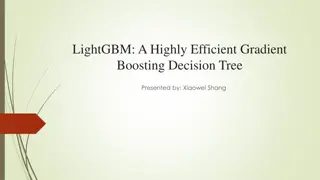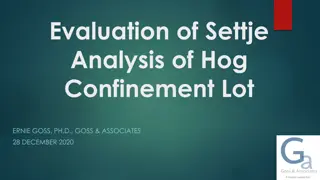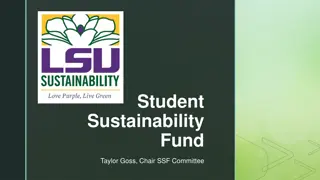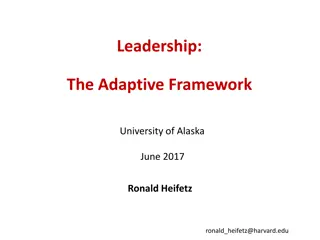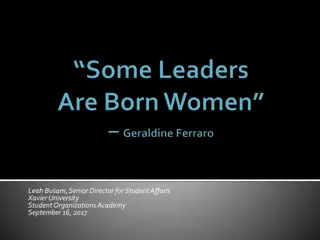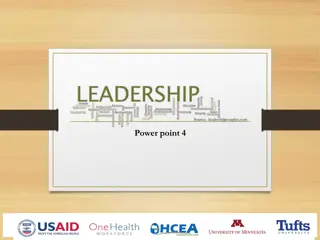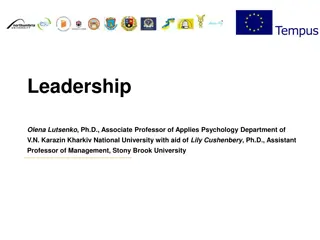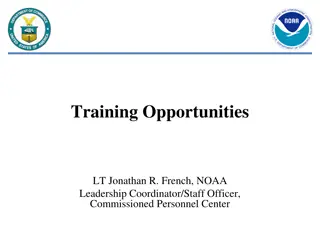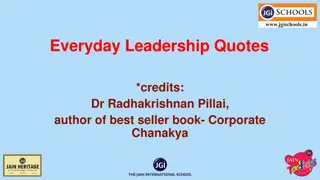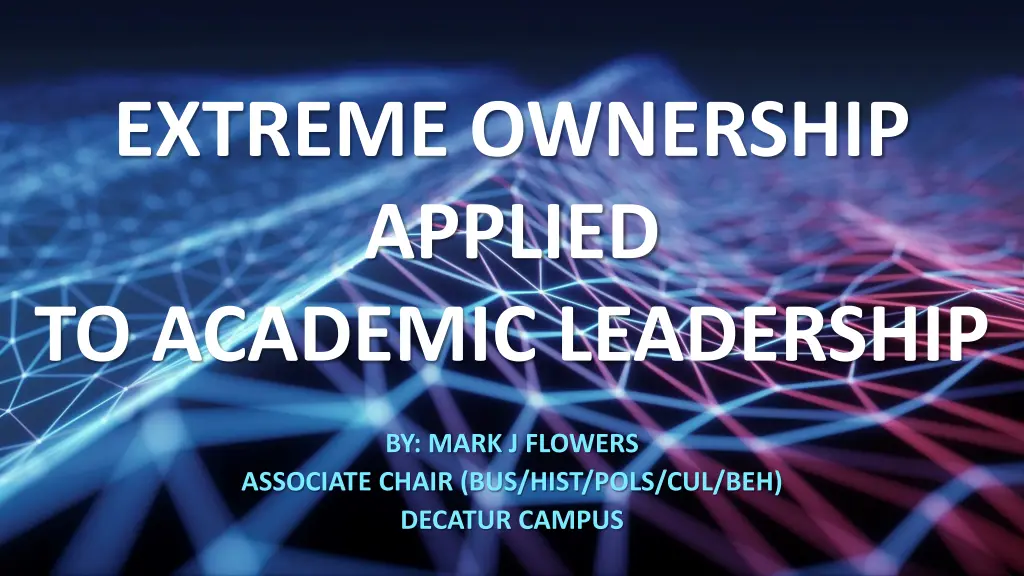
Leadership Challenges and Responsibilities in Academic Institutions
Explore the application of Extreme Ownership in academic leadership, as discussed by Mark J. Flowers. Discover Georgia State University's mission to transform lives and advance knowledge, while contemplating ways to improve DFW rates and student engagement. Reflect on the shared responsibility and accountability in student outcomes.
Download Presentation

Please find below an Image/Link to download the presentation.
The content on the website is provided AS IS for your information and personal use only. It may not be sold, licensed, or shared on other websites without obtaining consent from the author. If you encounter any issues during the download, it is possible that the publisher has removed the file from their server.
You are allowed to download the files provided on this website for personal or commercial use, subject to the condition that they are used lawfully. All files are the property of their respective owners.
The content on the website is provided AS IS for your information and personal use only. It may not be sold, licensed, or shared on other websites without obtaining consent from the author.
E N D
Presentation Transcript
EXTREME OWNERSHIP APPLIED TO ACADEMIC LEADERSHIP BY: MARK J FLOWERS ASSOCIATE CHAIR (BUS/HIST/POLS/CUL/BEH) DECATUR CAMPUS
WE HAVE A PLAN! WE CAN; ALL ANDS; NO BUTS NO BUTS https://www.youtube.com/watch?v=Htm0pTVl5Z0
GSU MISSION STATEMENT Georgia State University, an enterprising public research university, transforms the lives of students, advances the frontiers of knowledge and strengthens the workforce of the future. The university provides an outstanding education and exceptional support for students from all backgrounds. Georgia State readies students for professional pursuits, educates future leaders, and prepares citizens for lifelong learning. Enrolling one of the most diverse student bodies in the nation, the university provides educational opportunities for tens of thousands of students at the graduate, baccalaureate, associate, and certificate levels. Georgia State s scholarship and research focus on solving complex issues ranging from the most fundamental questions of the universe to the most challenging issues of our day. The scholarly work and artistic expression of the university s faculty create new knowledge, extend the boundaries of imagination, and enhance student learning. The university s presence in the Atlanta metropolitan area provides extraordinary experiential learning opportunities and supports the work of faculty tackling the challenges of an urbanizing nation and world.
OUR MISSION THE REAL MISSION To prepare our students for their future and ours.
WHY ARE WE HERE? Paycheck? Teach our Topic? Teach Students how to Learn? Pass Students to assure they graduate? Prepare for the future? Will we all be able to do this for 30 more years? 40? 60? Of course not! So, who does it next?
DFW RATES AND YEARS OF CONTEMPLATION DFW RATES AND YEARS OF CONTEMPLATION WITHOUT ANSWERS ONLY QUESTIONS! WITHOUT ANSWERS ONLY QUESTIONS! What can be done? Who can do it? Who is to blame and who should be responsible? How do we reach students who leave or who do not reach out? Why don t students come to office hours? Are we as approachable as we perceive ourselves to be?
WHO IS TO BLAME FOR WHO IS TO BLAME FOR OUR GETTING A GETTING A D, F, OR W The Student s themselves? Parents? Secondary School/Teachers? Government/Funding? Society? Student Behavior/Responsibilities Outside of School? You? Leadership! We are to BLAME! OUR STUDENTS STUDENTS D, F, OR W? ?
LEADERSHIP! WE ARE TO BLAME! LEADERSHIP! WE ARE TO BLAME! We never hear this But we should! It is a message we need to deliver to our faculty every semester It is a message higher level leaders need to deliver to our mid-level leaders every semester Why don t we say/hear this more often? WE ARE TO BLAME! WE ARE TO BLAME!
WHY ARE WE TO BLAME? WHY ARE WE TO BLAME? We are not cultivating the proper culture! We are not cultivating the proper culture! We are not cultivating the proper culture!
WHAT CULTURE SHOULD WE BE CULTIVATING? WHAT CULTURE SHOULD WE BE CULTIVATING? Faculty as Leaders Students as Leaders
What about: Trusting the Professionalism of the Team? Allowing for experimentation? Allowing for failure? Accountability for when the team fails? This means taking responsibility!
WHO ARE YOU AS A PROFESSOR? WHO ARE YOU AS A PROFESSOR? Highly Productive Highly Informed Highly Trained Highly Specialized Highly Knowledgeable Highly Experienced BA/BS = 22.2 % MA/MS = 9.6 % Ph.D. = 1.9%
WHO WERE YOU AS A STUDENT? WHO WERE YOU AS A STUDENT? Highly Interested Highly Engaged Highly Prepared Highly Motivated Highly Productive Highly Supported by Family, Peers, Both, or had life experience which taught you the importance of college
WHO ARE YOUR STUDENTS WHEN THE WHO ARE YOUR STUDENTS WHEN THE SEMESTER BEGINS? SEMESTER BEGINS? A students = Predetermined, so extend B, C, and D Students = OPPORTUNITY!! F-Students = Are they predetermined? Will we see them beyond the first day? If not, then predetermined outcome. If yes, then they are D-Students, not F!
OUR GOAL OUR GOAL We should not aim at training more elite people to replicate ourselves, we should aim to train our students so they can reach Beyond their current level.
TRAIN OUR STUDENTS SO THEY ARE AT TRAIN OUR STUDENTS SO THEY ARE AT LEAST GOOD ENOUGH! LEAST GOOD ENOUGH! B-Students, OPPORTUNITY!! What can we do to make them A students? C-Students, OPPORTUNITY!! What can we do to make them B students? A? D-Students, OPPORTUNITY!! We fail when these students remain D students. What can we do to help them reach C? If they fall to F then we have failed them; they have not failed themselves. That is on us. If they remain a D then we have failed them; they have not failed themselves. That is on us.
BUT GOOD ENOUGH SOUNDS BUT GOOD ENOUGH SOUNDS AWFUL! WE SHOULD AIM AT ELITE! AWFUL! WE SHOULD AIM AT ELITE! We must meet students where they are, and many are not ready to be treated as elite. Treating unprepared students as if they are elite will only discourage and exacerbate the issues we face. WE DO NOT KNOW HOW GOOD ENOUGH WILL TURN OUT, THEY COULD STILL BECOME ELITE! So, let s prepare them so they can become elite on their own terms. Who was your favorite teacher ever? What made them special? Why do you remember them? Stories? https://www.youtube.com/watch?v=4p5286T_kn0
BUT STUDENTS EARN THEIR BUT STUDENTS EARN THEIR GRADES, WE DON T GIVE THEM GRADES, WE DON T GIVE THEM Great! I agree! ... So what was the student s grade? 1. Did the student do what they needed to earn a C or better? 2. Did we do all we could to assure they earned a C or better? If the student earned a D, then did we do all we could to learn why they fell behind or weren t learning our material?
BUT THE STUDENT DID NOT COME BUT THE STUDENT DID NOT COME BACK AFTER ROLL VERIFICATION? BACK AFTER ROLL VERIFICATION? Did we see them several times or literally only once? If only once, the student is a deserter This is only one of two potential times we don t own the failure. The other is when circumstances were beyond everyone s control generally health or emergency related. Still, have we tried communicating with the student to try and bring them back? If not, then even this one is questionable. If several times, then why did they stop coming? Have we reached out to the student? Have we tried to assure you met the student on their level? Have we truly done our best to bring them back and help them catch up?
BUT WHAT ABOUT RESPONSIBILITY? SHOULDNT THE STUDENT BE RESPONSIBLE FOR THEIR OWN ACTIONS? Yes, but there are three problems with this assumption and question. 1. Does the student know how to be responsible for their own actions? What is their background? Did they come to us already prepared? Will failing them teach them the life-lesson they need to succeed next semester? Did we attempt to learn from where they are beginning this journey? MEET THEM WHERE THEY ARE, NOT WHERE YOU WANT OR EXPECT THEM TO BE. Everyone develops differently and comes to us from varying backgrounds and circumstances. Do not place expectations on them as if they should have been like us. 2. We are here to teach our content, not responsibility. Responsibility is a secondary effect, to be sure, but only if we meet the student where they are. 3. We are here to teach students how best to learn so they are prepared for their future. Responsibility will be a secondary effect of this too, but only if we meet them where they are.
BUT WHAT ABOUT ACADEMIC STANDARDS? Meeting students where they are does not mean we sacrifice academic standards. It means we must begin from the more realistic assumption that many may not already be of high academic caliber unless they have already identified themselves to us as such. It means we meet them where they are and prepare them for our increased future expectations. It means we do not begin with preconceived expectations about readiness. It means we begin where students begin and help them rise to meet our high expectations by the end of the semester.
ALL OF THIS IS HOW WE ACHIEVE EXCELLENCE, IN TEACHING AND IN STUDENT OUTCOMES. WE MUST OWN OUR FAILURES, AND THAT MEANS ADOPTING STUDENT FAILURES AS OUR OWN. LET S FOCUS ON THE POSITIVE. WHAT CAN WE DO?
BUT THAT MEANS WE HAVE TO FIRST KNOW BUT THAT MEANS WE HAVE TO FIRST KNOW FROM WHERE THEY ARE BEGINNING FROM WHERE THEY ARE BEGINNING
QUESTIONS? QUESTIONS?






